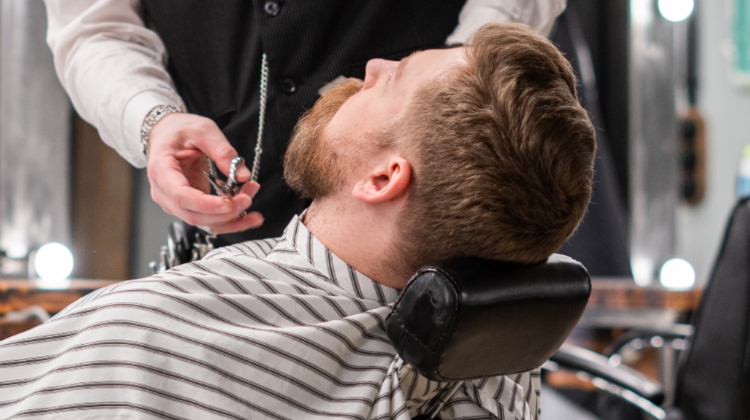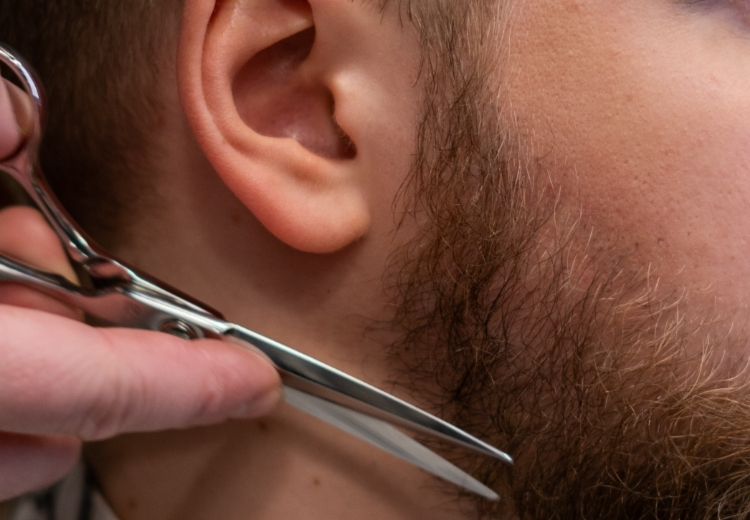Getting ready in a rush and cutting your skin while shaving is common. Do you also get shaving cuts that bleed while using a razor hastily? You cannot afford to be late for the office and cannot go with a bleeding face, either.
Additionally, these cuts stress you out because of the blood, scar marks, and potential risk of infection, right? So, are you looking for the steps to take to stop bleeding from shaving cuts and learn how to shave without cutting yourself? If yes, we got you.
Table of Contents:
- Part 1: Immediate Steps to Stop Bleeding
- Part 2: Natural Remedies to Stop Bleeding
- Part 3: How to Shave Without Cutting Yourself
- Part 4: Tips to Avoid Shaving Cuts
- Part 5: When to Seek Medical Attention
Part 1: Immediate Steps to Stop Bleeding
When you encounter a shaving cut, the first thing you should do is stop the bleeding immediately so that you can go on with your day without worrying the people around you. Below are the steps that can help you stop bleeding immediately.
Step 1: Apply Pressure
Take any tissue, towel, cloth, or gauze you can find easily, keep it on the bleeding cut, and apply pressure until active bleeding stops. Ensure that whichever material is clean.
Step 2: Warm Water Rinse
Once you have reduced the bleeding with the application of pressure, the next step is to wash the area to remove the blood that has been collected or clotted around the cut. For this, turn the warm water tap on and splash the water on the cut for 30 seconds or until you see no blood.
Step 3: Disinfect the Wound
In the 2 steps mentioned above, the bleeding stops. However, you cannot stop here because you do not want the cut to get infected or leave a scar, right? So, disinfect the wound with an antiseptic solution like pyridine.
If you cannot find an antiseptic solution nearby, take any alcohol-based cleanser or toner you have and clean the cut.
Step 4: Cold Compress
The next step is to calm the irritation and pain that is caused by cutting the skin with a razor. So, simply wrap an ice cube in a soft cloth and press it against your skin for 20 seconds or until you feel better.
It also helps in constricting the blood vessels and prevents recurrent bleeding from the same cut.
Step 5: Moisturize
The last thing is to soothe your skin like you would normally do after shaving. For this, apply your go-to moisturizer over the whole face and you can go on with your day.
Part 2: Natural Remedies to Stop Bleeding

If your bleeding does not seem to stop after trying the steps mentioned above and you get shaving cuts often, below are some natural and home remedies to stop bleeding.
1. Ice Cubes
Ice cubes can be your best bet when you want to stop bleeding quickly. The low-temperature cubes act on the vessel that has been cut, leading to the bleed. Using ice cubes reduces the diameter of the bleeding vessel, thus stopping the bleeding.
2. Coffee/Tea
Because of their blood vessel-constricting properties, you must have heard of how effective coffee and tea are for undereye puffiness. The same property can be used to control bleeding from a fresh shaving cut.
So, if you have a leftover tea bag in your fridge, grab it and apply it to the cut. If you do not have one, simply take a little amount of ground coffee from your drawer and press it on the cut.
3. Alum
Alum has a dual role in treating a shaving cut. It works as an antiseptic and applies pressure on the skin to stop bleeding as well.
Alum has been used to treat shaving cuts for decades. So, keeping a small block of alum in your washroom drawer is always good. Simply rinse the alum block and apply it on the cut to stop bleeding.
4. Aloe Vera Gel
Aloe vera gel has astringent properties to minimize shaving cuts, antiseptic properties to prevent infection, and healing properties to promote wound healing. It also helps in soothing the irritated skin. Furthermore, you can check additional uses of aloe vera gel in the benefits of aloe vera on skin and hair.
5. Deodorant, Vaseline, or Lip Balm
If you have a deodorant, apply it on the shaving cut. It will reduce bleeding because of the presence of aluminum chloride, which is also a natural vasoconstrictor.
In addition, you can apply a colorless lip balm to the shaving cut to form a moisturizing layer.
6. DIY Moisturizer
An after-shave lotion can also help. However, if you want to keep it natural, make your own DIY moisturizer. It can take a few minutes to make, but it can effectively reduce bleeding from a large shaving cut.
To make an anti-bleeding moisturizer, take aloe vera gel and add essential oil, witch hazel, and glycerine to it.
Part 3: How to Shave Without Cutting Yourself

How to properly shave body hair to prevent injury has already been explained. So, here we will primarily focus on how to shave without cutting yourself with the razor.
Step 1: Prepare your Skin, Hair, and Shaving Razor
Wash your face to cleanse it off the entrapped dirt or impurities. Then, dampen the hair with warm water to soften it and make shaving easier. After that, apply a skin-friendly shaving cream or shaving gel for lubrication.
Also, prepare a clean razor with sharp blades so that you do not have to put extra effort into shaving.
Step 2: Shave Gently
Start shaving in the direction of hair growth. Pull your skin a little taut, if necessary. But do not apply excessive pressure on the razor blades. Hold the razor firmly in your hand and shave along the grain in small strokes with minimum force.
Moreover, remember to rinse the razor every few strokes to remove the buildup of hair and shaving cream on it.
Step 3: Never Skip Aftercare
The above-mentioned steps are enough to prevent shaving cuts. However, you should also apply an after-shave lotion after you are done shaving your face. This will soothe the skin and prevent bumps, nicks, or ingrown hair, resulting in smooth skin.
Part 4: Tips to Avoid Shaving Cuts and Nicks

Prepare Your Skin
Preparing your skin before shaving is essential to getting a smooth and cut-free shave. You should prevent yourself from shaving on dehydrated, rough, bumpy, and unprepared skin. So, use a face wash and scrub before shaving to properly cleanse and exfoliate your skin.
Also, use warm water to soak and soften your hair.
Always Use a Lubricant
Dru shaving can increase the risk of cuts and shaving bumps. So, use any lubricant, whether conditioner, foam, shaving gel, or cream.
Moreover, check your skin type before buying the product and buy accordingly.
Work on Your Shaving Technique
Instead of shaving with just one move, use small strokes to eliminate the unwanted hair. The higher pressure can also increase the risk of cuts, so be gentle on your skin while shaving.
Moreover, shaving the area around your nose and mouth can be tricky, so shave slowly and gently around this area.
Shave in Direction of Hair Growth
Shaving against the grain increases resistance, shaving bumps, risk of ingrown hair, and cuts. So, move the razor in the direction same as that of your hair growth.
Use Cold Water at Last
Sometimes, minute cuts that are invisible to the naked eye can irritate your skin. To soothe the skin, wash your face with cold water and then apply a soothing lotion.
In addition to preventing shaving cuts, learn how to prevent razor burns here.
Part 5: When to Seek Medical Attention
Although bleeding from shaving cuts can be easily stopped at home, you still need medical attention in some cases to avoid scars, deep Injuries, and infections.
Severe Bleeding That Does not Seem to Stop
There are some cases when bleeding does not stop even if you have tried all the home remedies, medications, and other ways to stop it. It usually happens in the case of a blood disorder. So, if your bleeding does not stop even if it’s a minor cut after shaving, you need to consult a doctor immediately.
Signs of Infection
If you notice a pus-like discharge from your wound, you probably have an infection. Additionally, if you also have inflammation and fever along with the cut, it means the infection has spread and you need to take an immediate action
Severe Bleeding
Lastly, if the cut is large, bleeding profusely, and the bleeding is not stopping after a few minutes, you should immediately seek medical attention. Such cuts need proper anti-septic treatment and blood clotting medications.
Conclusion
Bleeding from a shaving razor is not a big deal as long as you know how to control and stop bleeding. For first-time shavers, it is common to have a few nicks and cuts as you learn to glide the blade across your face, particularly your jaws.
The main principles of treating a shaving cut include applying pressure, using a disinfectant, constricting blood vessels, and stimulating healing using topical or oral medications. Following the tips in this article will help you learn how to stop bleeding immediately and prevent the razor from cutting your skin in the first place, ensuring a swift shaving experience.
Furthermore, the best trick for a smooth, injury-free shave is to prevent shaving cuts in the first place. So, take your time to learn a good and safe shaving technique. Also, consult a doctor when you cannot stop bleeding or have the risk of spreading infection.

 By myulikeadmin
By myulikeadmin



